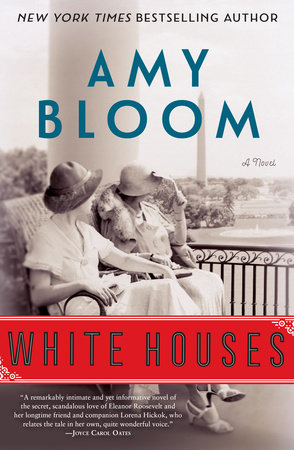Whitewashing, denial, gaslighting, saying black is white, Mad Hatter's Tea Party, 1984 doublespeak—all descriptors of our present condition with a President of the United States who seems to decide what's true with the casualness of a four-year-old playing an "invent-as-you-go" game. But although current events seem extreme, they are not without precedents. After all, we have long denied the facts of America's founding (see What Doris Kearns Goodwin Omitted blog), and we comfort ourselves with all sorts of blatantly untrue Bad Stories (per author Steve Almond).
In her new novel White Houses, Amy Bloom has lovingly exploded the lies of historians about Eleanor Roosevelt and renowned journalist Lorena Hickok, and oh, how exciting it was last night to sit in an audience at The Roosevelt House (where Roosevelt and Hickok first met) and listen to a discussion between Bloom and Blanche Wiesen Cook, historian and author of the Eleanor Roosevelt biography that inspired Bloom's novel.
After reading Wiesen Cook's controversial biography in which the long-time love affair and relationship was delineated, Bloom was drawn to read the thousands of original letters between Roosevelt and Hickok, and like Wiesen Cook, she could only conclude that previous historians had willfully altered the facts due to their own homophobia. Says Bloom, "The letters are amorous and people saying they didn't mean what they said is crazy! The facts, to me, open the door to a celebration and an illumination. This is an explanation of how love is."
White Houses is fiction—Bloom laughed about the fact that this is the first book that required her to declare that twice (in author's notes before and after the story)—about a love affair between people who are not young and glamorous. Real love. The kind that was maligned and trivialized by historians who said it simply could not be because Eleanor Roosevelt was buck-toothed and homely and Lorena Hickok was fat and exceedingly unattractive. How could such people be whole, sensual human beings with true love in their lives? "I wanted to write what it felt like," said Bloom.
And by doing so, I believe she rights a great wrong. Here is my review:

Her new book, like her previous novels Away and Lucky Us, is the story of a woman who has been spat out into the world as a child and, through moxie and amazing resilience, manages to live—in this case, an extraordinary life, despite the "inner hired girl" persona that clings to her psyche. White Houses's first-person narrator is real-life journalist Lorena Hickok, aka Hick, who tells her life story and the story of her love affair with Eleanor Roosevelt.
When the characters in a novel are real historical persons, it is almost impossible for a reader to not wonder what's true and what's not. So, despite two author's notes assuring us that this "is a work of fiction, from beginning to end," midway through, I found myself checking the above-linked Wikipedia bio, and it actually enhanced my reading experience. The bio gave me a sense of the homophobia that informed historians' reluctance to label the relationship between Hick and Eleanor a love affair. And it made me enjoy Amy Bloom's moxie in laying it all out, sensually and without apology. And I felt more deeply for these women who had to hide what was probably the great love of their lives.
I'm not gay, and this book, maybe more than anything else I've read, made me empathize with that particular pain of dwelling in a cultural prison of bias. I hope the spirits of both Ms. Hickok and Ms. Roosevelt are tickled pink.

Written after Lorena Hickok left Eleanor, this 1958 book was one of my childhood favorites. Her dedication reads,
In grateful Memory of
Teacher . . .
Who led a little girl out of the dark
And gave to the world . . .
Helen Keller
Now that I know so much more about Hickok, I understand this quote in my heart.
